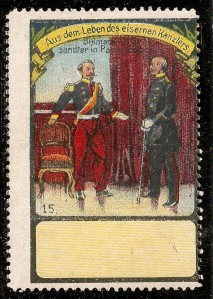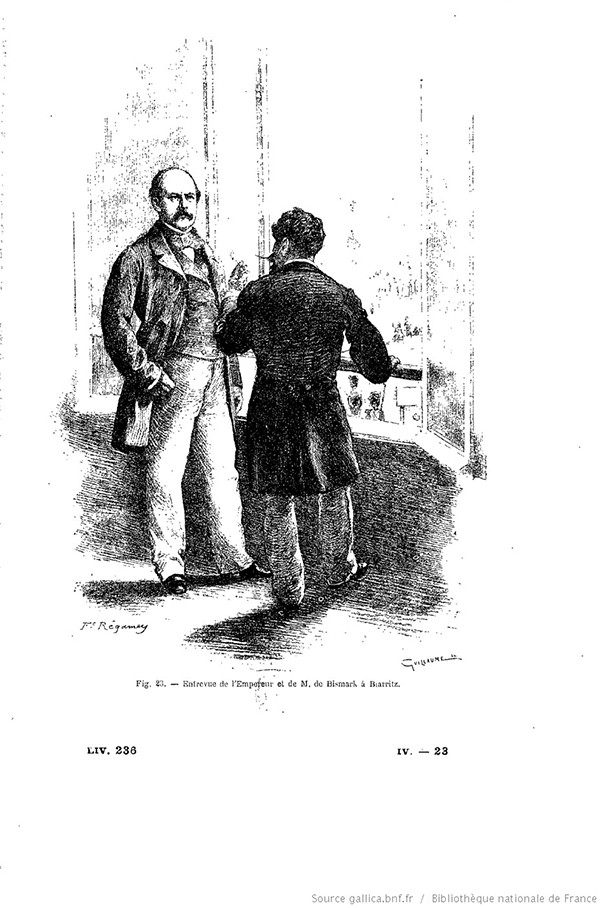The geopolitical context
The end of the Second Schleswig War (Deutsch-Dänischer Krieg) did not put an end to the ambitions of the Prussian Minister-President, Bismarck. Throughout the year 1865, the duchies of Holstein and Lauenburg, which had been left without a government after the death of the King of Denmark in 1863, remained a point of tension in Europe. The distribution of these territories between Prussia and Austria had been decided by the Treaty of Vienna on 30 October 1864, but the compromise made by the Austro-Prussian condominium concerning these territories remained fragile throughout the year 1865.
When Austria proposed to entrust the fate of the duchies to the Diet of Frankfurt a few months after the treaty, Prussia immediately threatened to put its troops on alert. A new, lukewarm convention, signed at Gastein on 14 August 1865 gave total administrative control of Schleswig to Prussia, temporarily ending the threat of conflict. Holstein was entrusted to Austria with special authorisations to appease Bismarck: Kiel harbour was transformed into a Prussian port of war; construction of a canal between the North and the Baltic began; and telegraph lines and railways on lands administered by the Austrian Empire were opened to Prussia. In order to avoid an open conflict, the Austrian Emperor Franz Joseph also sold his rights on the Lauenbourg to the King of Prussia for 2.5 million Danish thaler.
With Vienna weakened, Bismarck was encouraged to continue work on undermining the Austrian Empire. Ever since the heavy handed resolution of the Polish uprising of 1863, Prussia benefitted from Russian support, since Prussia had more or less secretly supported Russia to quell the insurgents. Britain had no intention to engage in armed conflict on the continent even though the fate of the Poles had moved many members. Isolated politically, Franz Joseph had seen his empire shaken by multiple insurgencies, particularly in Italy since the war against Piedmont, and he was severely lacking a powerful ally.
The Italian question remained one of Napoleon III's principal concerns at that time, since he was allied with Piedmont. During the 1860s, the French Emperor urged Franz Joseph to cede the Veneto in order to create greater Italian unity and peace in the peninsula, and in particular to protect the Papal States. The Austrian Emperor refused.
Bismarck intended to benefit from this situation to ensure the neutrality of France if he pursued his conquests over the German-speaking territories. Napoleon III was still basking in his victories in Italy and his army was considered the most powerful on the continent. A trade treaty signed between Prussia and France in 1862 shows that there was already a commitment between the two countries at that time. Shortly before the meeting in Biarritz, Bismarck attempted to increase understanding between the two nations by declaring to the French ambassador in Prussia in September 1865 that France “whose right Prussia recognizes to expand if desired wherever French is spoken in the world, would herself consent, by a constant good will, to guarantee Prussia against the dangers which it would be threatened by another side”. This ambiguous introduction to the interview of Biarritz sums up the confusion or misunderstanding, which would soon take place.
The Biarritz meeting

The Minister-President of Prussia joined the court of the Emperor of the French on the Basque coast from 4 to 12 October 1865, where he had specific exchanges with Napoleon III, (we only know his version of events in a report to the Prussian King William). Mérimée, who was present at court in Biarritz, wrote: “There was a great conversation between the Emperor and Bismarck, about which neither one of them told me anything. My impression was that he was politely but coolly received”. Later, Emile Ollivier, who obviously was not present at these meetings since he was opposed to the Emperor at the time, reported Napoleon III's own account of the event in his chapter devoted to the Biarritz talks in l'Empire libéral, his major work in 17 volumes (1895): Napoleon III (in his own words) was “neither offensive nor extraordinarily eager, simply friendly and distinguished”.
It appeared that Bismarck first raised the issue of the duchies and his willingness to fully annex the territories, including Holstein, with compensation for Austria. This solution does not seem to have bothered Napoleon III. The French sovereign may at the time have considered that there was no basis for a resumption of armed conflict with Austria about these territories, the negotiations having already lasted for months; Austria had seemed to cede voluntarily during the negotiations and the promise of financial compensation seemed to suggest the feasibility of future amicable negotiations.
The Minister-President Bismarck had also expressed his support for the detachment of the Veneto from the Austrian Empire. This inclination favourable to the Italian cause, would undoubtedly have pleased Napoleon III who had campaigned for this solution for years. The idea of overall German unity did not seem to be an important issue for Napoleon III but he seemed nevertheless open to the Prussian desire to reorganize northern Germany under its aegis. Provided that the Main would not be crossed, (that is, the horizontal tributary of the Rhine). So therefore whilst providing Bismarck with a guarantee of the impossibility of an alliance between France and Austria, Napoleon III must have seen in the ambitions of Prussia a way to balance the power relations in German-speaking territories at the expense of Austria and thus in favour of Italy.
A final exchange between Bismarck and Napoleon III took place in October 1865 upon the return of the two men to Paris: and just as in Biarritz, no official agreement was reached and it concluded on a friendly but reserved tone.
The impact of the meeting
Napoleon later admitted to having not actually managed to “sort out exactly what Bismarck wanted and he made no formal proposal. For my part, I expressed no personal desire whatsoever”(quoted by Emile Ollivier). Indeed, the Minister-President did not wish to sign an agreement with France but just probe the Emperor on his possible support for Austria.
The interview with Bismarck in Biarritz ensured that the way for negotiations with Italy was open, even encouraged by France. Napoleon III did not yet see the consequences of opening two fronts that would run aground Austria and even sign the death sentence for the entire German Confederation; only the “liberation of the Veneto” seemed to matter to him, and the vague mention of territorial compensation for France to balance everything out.
“In Biarritz, there was no possibility for talk, because if one of the parties had something to ask for, he had nothing to offer in exchange,” wrote Emile Ollivier in his writings. The mediations as well as the territorial claims of Napoleon III a few months later after the Austro-Prussian War would have little in common with the discussions that had taken place at Biarritz.
(Translation RY)


